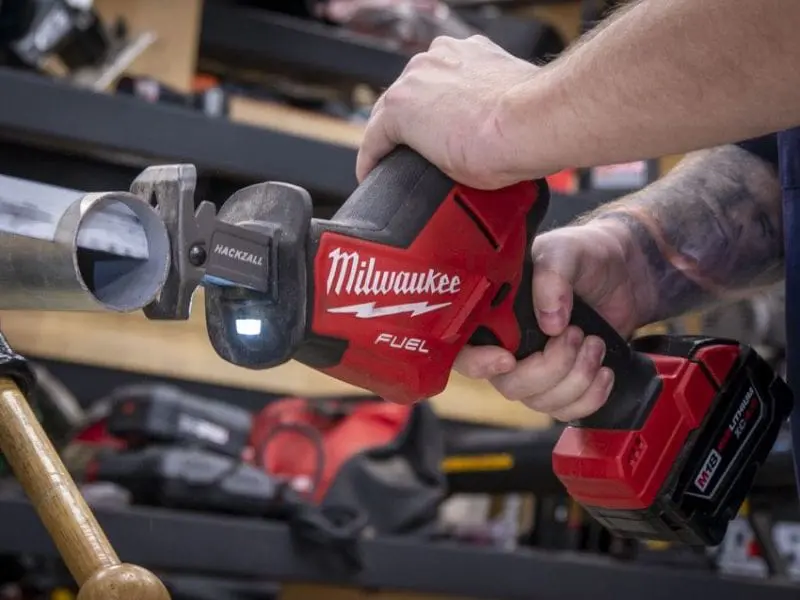The DeWalt Atomic reciprocating saw didn’t make it in time for our best cordless reciprocating saw article. However, it’s here now, and we’re putting it up against the best. Place your bets and buckle your seat belts—it’s the DeWalt Atomic Reciprocating Saw vs Milwaukee M18 Fuel Hackzall is this Thursday Throwdown!
Editor’s note: Check out our in-depth breakdown of Milwaukee vs DeWalt as tool brands and companies.
DeWalt Atomic Reciprocating Saw Vs Milwaukee M18 Fuel Hackzall
Here are our two competitors for today’s matchup:
DeWalt Atomic 20V Max Reciprocating Saw DCS369

- Tested Battery: DeWalt 20V Max 5.0Ah
- Motor: Brushless
- Stroke Length: 5/8″
- Stroke Speed: 0 – 2800 SPM
Milwaukee M18 Fuel Hackzall 2719
- Tested Battery: Milwaukee M18 5.0Ah
- Motor: Brushless
- Stroke Length: 7/8″
- Stroke Speed: 0 – 3000 SPM
Size
Just setting these two saws side-by-side, it’s clear that DeWalt has a more compact design. At 12.4″ long, it’s the smallest design in the 18V one-hand class. On the other hand, Milwaukee is more than an inch and a half longer at 14.0″
Verdict: DeWalt

Weight
Without batteries, DeWalt’s Atomic is significantly lighter—3.2 pounds vs 4.1 pounds. With the 5.0Ah batteries we tested, the gap grows a little bit. The Milwaukee M18 Fuel Hackzall’s 5.7-pounds full weight is more than a pound heavier than the DeWalt Atomic reciprocating saw at 4.6 pounds.
Verdict: DeWalt
Feature Set
When it comes to features, here’s what we look for:
| DeWalt Atomic Recip Saw | Milwaukee M18 Fuel HackZall | |
|---|---|---|
| Brushless Motor | Yes | Yes |
| Orbital Action | No | No |
| Variable Speed Dial | No | No |
| Tool-Free Adjustable Shoe | No | No |
| Pivoting Shoe | Yes | Yes |
| Blade Release | Shaft Lock | Shaft Lock |
| LED Light | Yes | Yes |
| Spring Blade Ejection | No | No |
On the surface, these two saws are neck-and-neck with the features we expect to see on one-hand reciprocating saws. But DeWalt takes a turn and adds two features that no other saw we’ve tested has.
The first is a belt hook. Yep, a simple belt hook. The DeWalt Atomic reciprocating saw is light enough to justify having.

The other is a shoe design that has a claw for gripping material. You can hook it on 2x material, round stock, ladder rungs, and more. Whether you use it or the belt hook, we love that DeWalt took the extra steps to add both.

Verdict: DeWalt
Nail-Embedded Wood Cutting
Most one-hand reciprocating saws aren’t great at cutting wood, especially 2x. However, some are good enough at it to get electricians and plumbers out of the occasional pinch, so we test it as a baseline.

Using 2 x 10 pressure-treated pine with five 16D nails in it and adding 5 pounds of weight to each saw, DeWalt needs an average of 52.62 seconds to cut through. Milwaukee needs just 32.91 seconds.
That’s not a surprising result when you look at the spec sheet. We expect Milwaukee’s 3000 SPM and 7/8″ stroke length to easily outstrip DeWalt’s 2800 SPM and 5/8″ stroke length. What’s left to ponder is how it will affect cutting thin materials.
Verdict: Milwaukee
Metal Cutting
We used 3/4″ EMT to see kind of cutting speed you should expect in thin metal.

In this test, DeWalt posts an average cut speed of 6.04 seconds—the second slowest speed we tested. Milwaukee accomplished the same cut more than twice as fast, finishing with a 2.66-second average.
Verdict: Milwaukee
PVC Cutting
Switching over to 3″ PVC, the gap in cutting performance doesn’t change much. The DeWalt Atomic reciprocating saw needs 12.77 seconds to make the cut while Milwaukee’s M18 Fuel Hackzall does it in just 5.47 seconds on average.

Verdict: Milwaukee
Vibration
For our vibration testing, we had our testing team score every saw in the class on a 1 – 4 scale. We cut wood, metal, and PVC, focusing on how good the vibration control is in each.

In our original head-to-head review, Milwaukee had the best vibration control in the class. However, our tests with the DeWalt Atomic push it ahead of Milwaukee as the new leader!
Once the results were in, DeWalt finished with a vibration control score of 100 with Milwaukee posting an excellent 94 points. We don’t think there a reason to be disappointed with either one in this test.
Verdict: DeWalt
Compatible Tools
When it comes to compatible tools, both of these brands go really deep. Considering these one-hand reciprocating saws do a lot of work for electricians and plumbers, we have to take that into consideration.
On the M18 battery platform, there are several trade-specific tools that DeWalt doesn’t have yet. In the end, it’s a difference that tips the scale clearly in Milwaukee’s favor.
Verdict: Milwaukee
Price
The DeWalt Atomic reciprocating saw runs $149 as a bare tool and $269 as a kit with a 5.0Ah battery. Milwaukee sits at $159 as a bare tool and $269 for the 5.0Ah battery kit.
If you’re already on one of these platforms, DeWalt’s bare tool price wins the day. If you’re not, it’s a toss-up. To settle things, we put both saws under the microscope of our value algorithm to see if we can get some separation.
DeWalt came away with 77 points on our value scale—1 more than Milwaukee’s 76 points.
Verdict: DeWalt
Warranty
DeWalt’s standard warranty is 3 years and includes a 1-year service agreement and a 90-day money-back return guarantee. Milwaukee gives you a 5-year warranty. We’ll take the extra 2 years.
Verdict: Milwaukee
DeWalt Atomic Reciprocating Saw Vs Milwaukee M18 Fuel Hackzall Final Verdict
Adding up the final scores, we end up with 5 – 5 tie. But it’s not really a tie when you look at the stark differences in design. DeWalt clearly went after the most compact design while Milwaukee targeted higher performance. Which one you decide on really boils down to where your priorities are between those two design philosophies.
Buy the DeWalt Atomic reciprocating saw if you’re looking for the smallest saw you can get with the best vibration control.
Buy the Milwaukee M18 Fuel Hackzall if you want top-tier cutting performance and deeper compatibility with trade-specific tools for electricians and plumbers.



